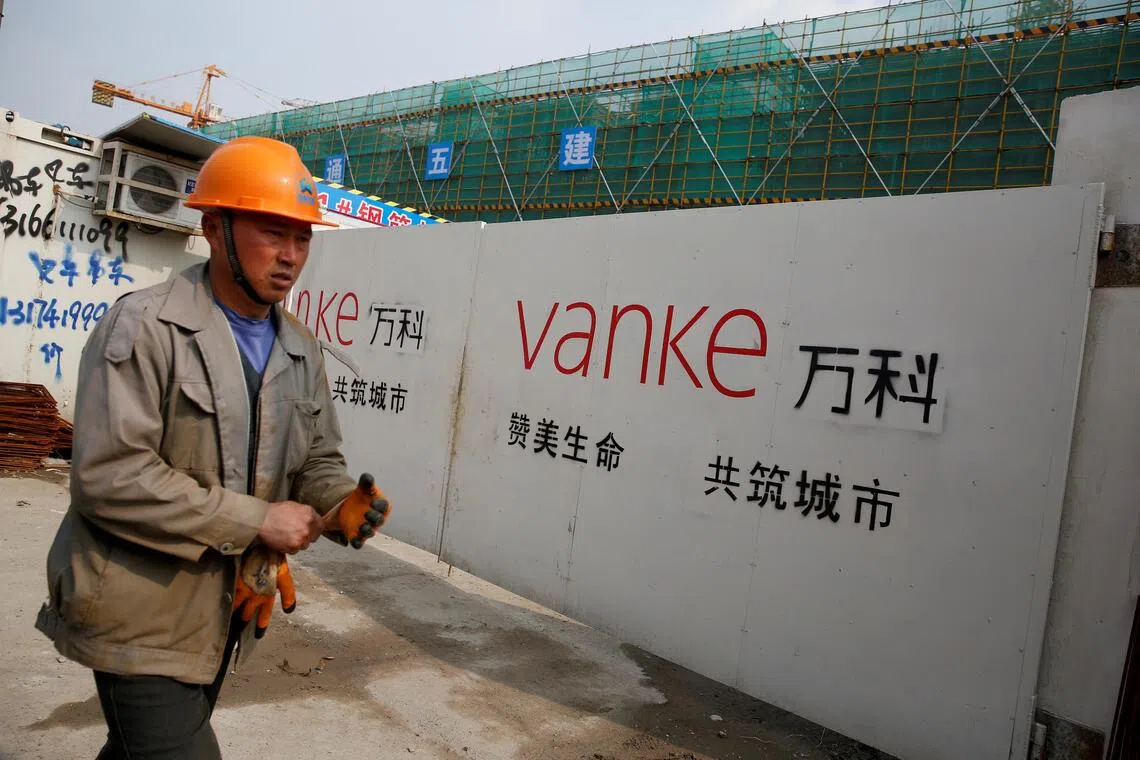China property crisis thrust back into spotlight by Vanke plunge
Sign up now: Get ST's newsletters delivered to your inbox

Once China’s largest developer and now a bellwether for the nation’s struggles to staunch broader property woes, Vanke plunged in credit markets this week.
PHOTO: REUTERS
BEIJING – China’s property market is bracing itself for a worsening crisis at state-backed China Vanke, as the builder struggles to convince investors it can avoid default in the months ahead without clearer signs of government support.
Once China’s largest developer and now a bellwether for the nation’s struggles to staunch broader property woes, Vanke plunged in credit markets this week.
Its dollar bond due in 2027 declined further on Nov 26 after sliding a record 12 US cents the previous day. It last traded at a distressed level below 44 US cents, the lowest since January.
Its onshore bonds extended declines, with one bond falling more than 20 per cent, triggering trading suspension by the Shenzhen Stock Exchange.
Several other onshore bonds from Vanke also fell more than 10 per cent, including one due in March 2027.
Vanke’s woes spotlight the broader challenges facing policymakers as they balance efforts to revive a housing market stung by record builder defaults while trying to avoid getting mired in rescuing individual firms.
The country has been considering new measures to turn around the market, such as subsidising interest costs on new mortgages, people familiar with the matter said last week.
Despite a raft of easing measures in the past year, new home sales have been declining.
As they try to cushion against the impact from debt problems, the authorities are scrutinising borrowers more.
Financial regulators are stepping up scrutiny of bond market violations, focusing on disclosure failures related to debt defaults, particularly in the real estate sector, according to a report in the official Shanghai Securities News.
Vanke has long been viewed as a benchmark for gauging the government’s stance on the property sector.
Its largest shareholder, state-owned Shenzhen Metro Group, has already extended about 30 billion yuan (S$5.5 billion) in shareholder loans to the cash-strapped builder. It is a crucial funding source that has helped Vanke repay bonds and avoid defaults so far in 2025.
That lifeline, however, has been in doubt since October, when former chairman Xin Jie resigned and the state-backed shareholder signalled tighter borrowing terms for Vanke.
The notes due 2027 have lost more than 40 per cent in the past month, in a sign of investors’ mounting concern about how the firm will navigate a wall of debt maturities in the coming months.
About 13.4 billion yuan of onshore bonds are due to mature or face redemption options by the end of June 2026, according to Bloomberg calculations. That is far more than the amount of untapped loans Vanke has available from Shenzhen Metro, based on their latest pact.
According to that agreement, Vanke can receive a maximum 22 billion yuan of loans between the start of 2025 and the date of its annual general meeting, which is expected to be no later than June 30. Because of the loans it has already drawn, it has little left over until the middle of 2026.
Vanke faces immediate tests in December when two onshore bonds come due. A 2 billion yuan note and a 3.7 billion yuan security will mature on Dec 15 and Dec 28, respectively.
Should the company propose to extend the two bonds, it could face mounting challenges to get enough creditor support.
Any proposal would need at least 90 per cent of holders of each note to vote in favour, according to prospectuses of the securities. BLOOMBERG


